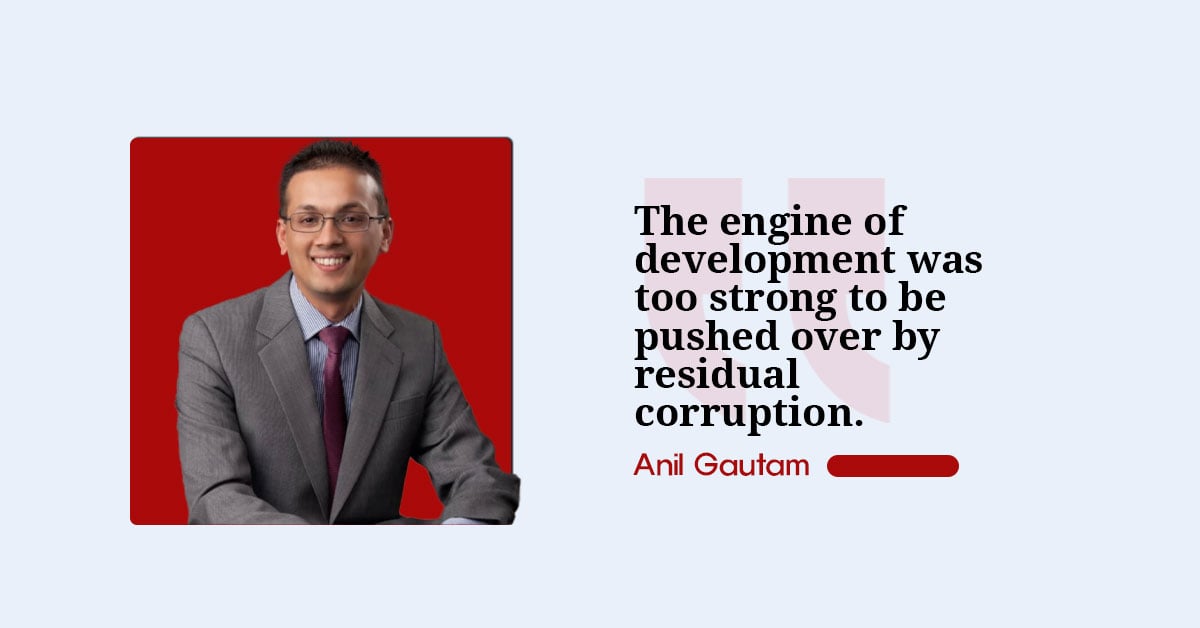

KATHMANDU: A peaceful protest by Gen Z on September 8 in Nepal descended into police brutality — children were killed, and with them, the final restraint on the people’s long-suppressed rage shattered, spilling into the streets. Power crumbled overnight.
But then, the oppressed turned into aggressors. Perhaps a fraction acted out of grievance, or maybe agenda-driven elements seized the chaos. Regardless, they burned institutions not only to the ground but to the core of their meaning.
Here’s a hypothetical theory of what happened: by imposing the ban on social media suddenly — without transparent groundwork such as dialogue, clear compliance rules, or warnings — it came across as reactive and authoritarian.
Even if there were genuine concerns — security, regulation, tax, misinformation — the manner of execution undermined legitimacy. After meeting with Vladimir Putin at the recently concluded SCO Summit in China, then–Prime Minister KP Oli seems to have drawn the wrong lesson: that clamping down on social media would project authority. It exposed a serious miscalculation.
Oppression survives on habitual obedience, but it also breeds resentment, discontent, and quiet fury. There was already plenty of that simmering, waiting for a spark — in this case, seething outrage at the slaughter of uniformed schoolchildren — that finally ignited it. Obedience exploded into rage. The collapse felt sudden, almost instantaneous.
History supports this theory. In France and Russia, elites seemed immovable — until a tipping point exposed their dependence on the very people they controlled. The French aristocracy fell once peasants and urban workers stopped recognizing their authority.
The Russian Tsarist system unravelled when soldiers and workers turned on it. In both cases, collapse was rapid because the “machinery of obedience” is always more fragile than it appears.
More recent examples include Sri Lanka’s economic implosion and Bangladesh’s violent protests. The theory still holds; the only difference may be the accelerant of social media, which makes these examples feel more sudden compared to the years of revolution in France and Russia.
Unfortunately for us, history shows that these revolutions rarely deliver what people hope for. As the song goes, “Meet the new boss, same as the old boss.” Too often, old elites are swept away, and opportunistic actors — whether revolutionaries, criminals, or demagogues — step in quickly, shaping the chaos to their advantage.
We’ve seen this before: the collapse of government does not cure corruption; it simply replaces one set of power brokers with another, leaving the public disillusioned.
Corruption is not the root of our problems. It is a symptom of something deeper: a society that rewards cunning over conscience. I remember my mother scolding me for waiting too long in a queue to pay a bill. “Mero chhoro laato jasto herera basirancha” (“My son just sits there like a fool”). Why? Because the real mark of strength, in her eyes, was finding a way to get things done faster — and more importantly, before anyone else. Multiply that ethos across generations, and it becomes the hidden engine of systemic dysfunction, seeping from our homes into bureaucracy, politics, and national life.
I truly believe this moment presents an opportunity to reset. Whoever comes into power must prioritize rebuilding strong institutions — not just in name, but in practice. That means replacing obviously corrupt officials and filling key positions through a merit-based process, where capable and honest individuals take charge. At the same time, stabilizing the economy is essential; any collapse would be a complete disaster — “bhui ko tipda kheri polto ko khasyo” (you lose what you have while bending down to pick up something, or ‘in trying to grasp all, you lose all’).
A slow grind of reform is frustrating and uneven, yes. But if we are to shift from valuing cunning and connections toward civic duty and integrity, this change cannot be ordered from above. It must be lived into the culture — through institutions, policies, education, and model examples like Sushila Karki, Balen Shah, and Harka Sampang.
I assume that the fact the entire government apparatus tried to dig up dirt on them and came up empty-handed is a testament to their integrity. It will be slow, but it’s the only way for values to become habit instead of imposed morality.
Other nations offer lessons. Japan and Singapore made public-sector corruption taboo not merely through law, but by embedding integrity and duty into social expectations. Governance worked because the collective conscience mattered more than individual shortcuts. Public servants (including ministers) were paid extremely high salaries to reduce temptation.
South Korea is somewhat different: it industrialized rapidly despite what appears to be political cronyism and opaque business–government deals. Probably because the root enabler of growth was meritocratic and disciplined systems — investment in education, infrastructure, technological catch-up, and a workforce oriented toward skill and productivity.
The engine of development was too strong to be pushed over by residual corruption. Society’s priorities, it seems, matter more than the absolute absence of corruption. A society that values innovation, work ethic, and long-term planning can prosper even if some level of corruption exists — as it does in every society.
We, in contrast, risk reshuffling elites without reshaping the values that sustain them. If we are to break this cycle, we must focus not just on who holds power, but on what society prizes — civic duty, integrity, and the patience to build institutions that endure.
Anything else is just a change of faces in the same game. Change the game. Let’s start here: it’s time to teach the next generations — Gen Z, Gen Alpha, and all those who follow — simple yet powerful habits: standing in line, treating public property as your own, voting honestly, and embracing critical thinking instead of blindly following.
By shaping both the model examples at the top through good leadership, and instilling these core values at the bottom, we can begin the long-overdue transformation of our nation.